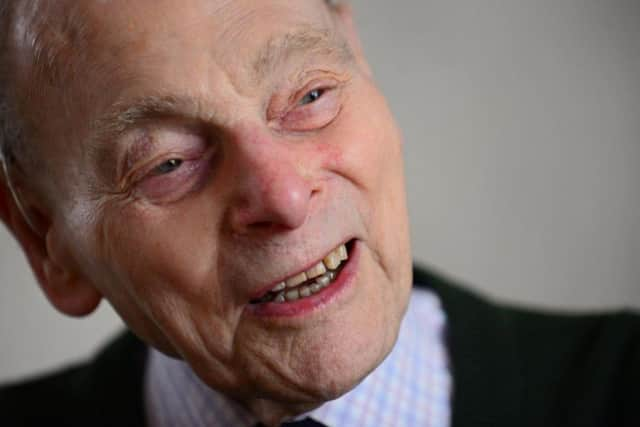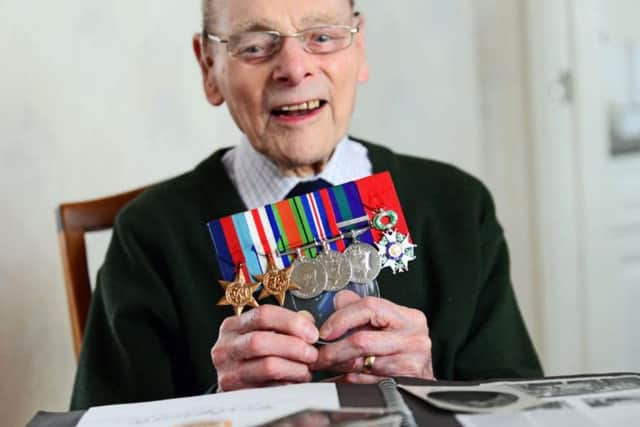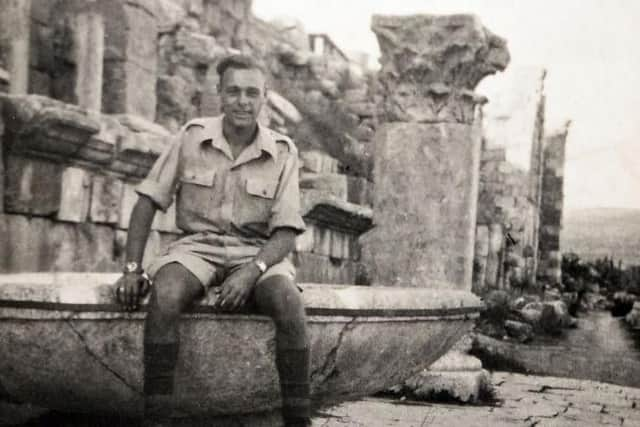Sheffield D-Day veteran's 'last trip' back to Normandy - aged 94
Part of the ever-dwindling band of liberators this year marking the 75th anniversary of D-Day, 94-year-old Mr Drabble, from Sheffield, has been making the annual pilgrimage for two decades with wife Vi.
Mr Drabble, 94, from Sheffield, who has been making the annual pilgrimage for two decades with wife Vi, is one if more than 300 veterans - including some who have never been back before - taking part in next week’s commemorations.
All are in their 90s - the oldest is 101.


Advertisement
Hide AdAdvertisement
Hide AdThe Drabbles, who are travelling in a group of 40 veterans with the charity D-Day Revisited, are planning a day’s rest during a packed programme, which starts in Portsmouth and heads to France on Monday - but there are two events they do not want to miss.
One is at Thury-Harcourt, the town where he was wounded in August 1944 - and the other, the official service of remembrance at Bayeux cemetery, where he will, as usual, place a wooden cross on the graves of some of the youngsters who served with him.
He recalls that when he landed on Gold Beach, around a fortnight after D-Day, the fields were littered with the upturned, bloated corpses of cows, their feet in the air, unleashing a horrid stench every time they were hit by shrapnel. The trees, now in full leaf, were “shattered.”
His group were a follow-up unit, without much battle experience, assigned to the Wolverhampton Territorial Unit. “They had been at Dunkirk, a lot were miners and they were good at digging in!,” the retired Cadbury’s rep recalls.


Advertisement
Hide AdAdvertisement
Hide Ad-> Humbling Second World War stories of region’s D-Day veterans deserve to be told - The Yorkshire Post saysBy the time they landed Bayeux had been taken, so they moved up to Caen where a massive bombardment was unleashed by 450 Lancasters with heavy shelling from land and sea.
“Eventually on July 8 we were part of the attack which caused immense damage to the town and heavy casualties of both troops and civilians. There were at least 6000 killed in Caen itself. What a terrible waste of life,” he wrote in a memoir.
On July 18 they were detailed to take Bordel Wood, only backed up by three tanks firing haphazardly into the wood.
The result was that three sergeants and two corporals were killed by automatic fire, mainly from high up in the trees.


Advertisement
Hide AdAdvertisement
Hide Ad“One sergeant - his name was Payne - was at the side of me and they just riddled him with machine-gun fire. It is such a shame, he had just got married before they left Ireland to an Ulster girl.”
On August 12 they were on a hillside near Thury-Harcourt, when they were overrun by an early morning counter attack. They were rescued by a reserve unit, but were then subjected to shelling, “the trees above us showering shrapnel down on us.”
Although they were in slit trenches, one youngster was killed, “a very quiet lad” whose surname was Renshaw, who is also buried at Bayeux.
-> The D-Day village in Normandy that will never forget its liberation by Yorkshire soldiers – Andrew VineMr Drabble had a piece of shrapnel in his shoulder which went into his lung area, but “not too bad when you think of the horrendous injuries the other men had.”
Advertisement
Hide AdAdvertisement
Hide AdAfter the liberation of Thury-Harcourt little of the town was left standing - the 59th Division had also taken 90 per cent casualties.
And people there have never forgotten what the soldiers did for them - Mr Drabble chuckles as he remembers being sent over a glass of Calvados by a well-wisher on a previous visit.
In 2013 he was awarded the freedom of the town by Mayor Paul Chandelier. No doubt next week they will lay on a fantastic reception as they always have done.
Such is their enthusiasm that the schoolchildren have even been taught to sing the National Anthem in English.
Advertisement
Hide AdAdvertisement
Hide AdHe said: “In Normandy they are marvellous. It is overwhelming. We were doing what we had to - but they don’t see it that way of course.”
As for being called a hero: “It’s a word I don’t like - there were so many involved in the War and so many heros.”
And he says this is definitely the last trip: “I’ve said to my wife: ‘If you want to go again, you go - but I shan’t go again I am certain of that.”